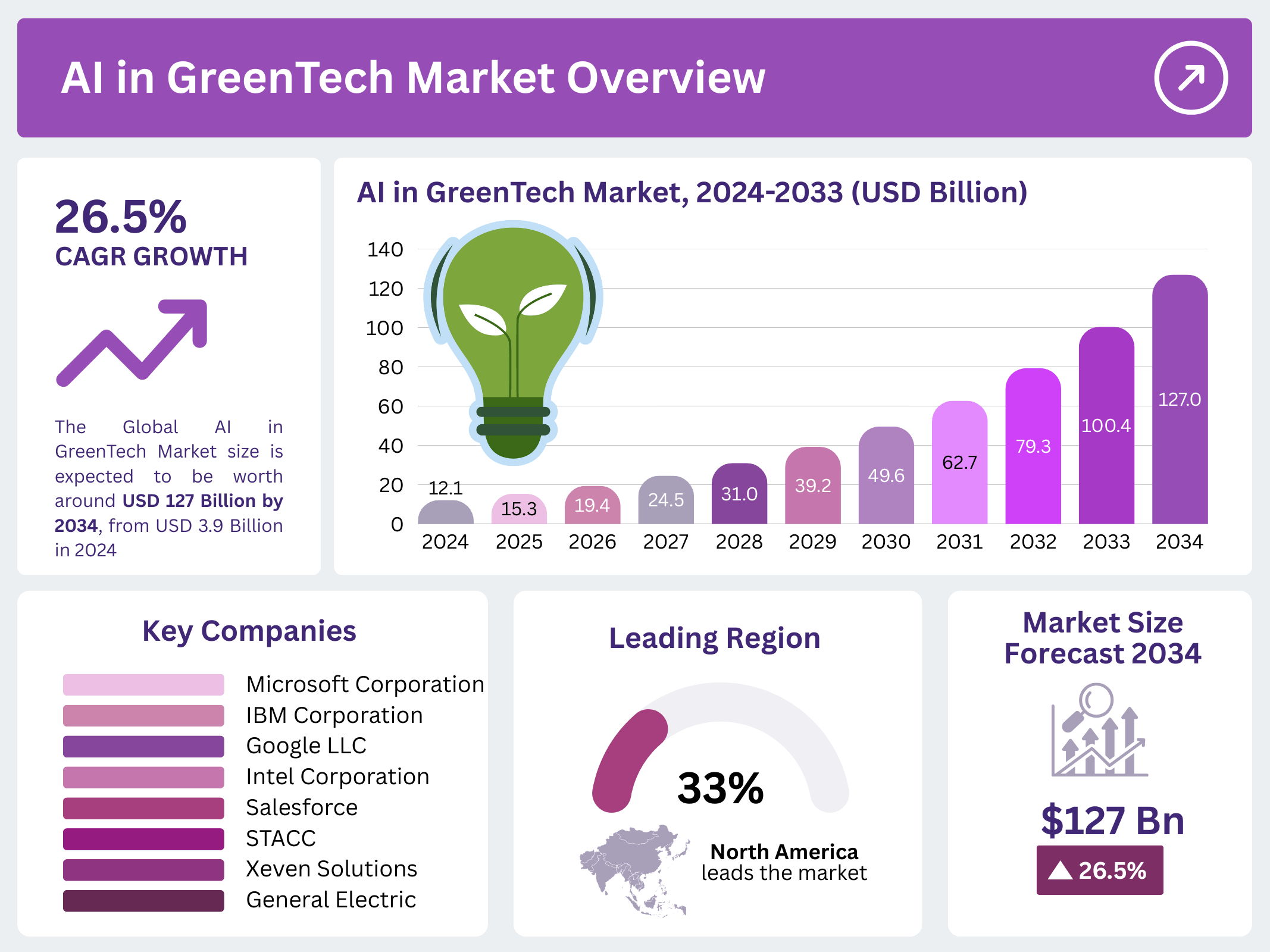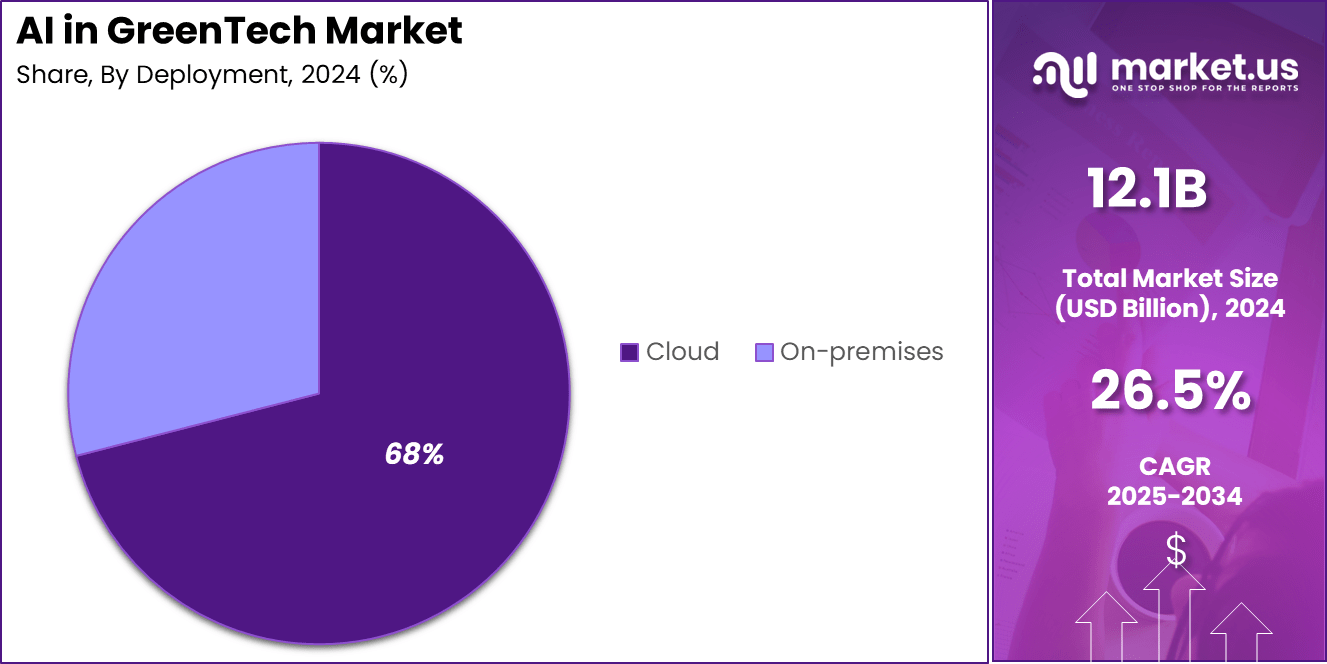
Quick Navigation
Market Overview
The Global AI in GreenTech Market is accelerating rapidly, expected to grow from USD 12.1 billion in 2024 to USD 127 billion by 2034, reflecting an impressive CAGR of 26.5% (2025–2034). In 2024, North America accounted for over 33% market share, valued at USD 3.9 billion, thanks to early adoption of renewable AI-powered solutions and deep venture capital investments in sustainability technologies. AI is emerging as a crucial driver for climate innovation, enabling advanced energy optimization, carbon tracking, waste management, and water conservation strategies across industries striving for net-zero commitments.
Economic Impact of Growth
The rise of AI in GreenTech is reshaping global economies. By accelerating clean energy deployment, optimizing energy grids, and improving supply-side resource efficiency, AI integration reduces costs while expanding investment flows into sustainable projects. The sector is fueling green job creation across analytics, machine learning, and renewable infrastructure, while also ensuring optimized resource allocation. Moreover, as nations push toward carbon neutrality, AI in GreenTech enhances compliance with ESG norms, driving both corporate responsibility and broader economic transition toward circular economies, boosting GDP contributions in technology-led nations.
Know what leaders know! Request now @ https://market.us/report/ai-in-greentech-market/free-sample/

Business Impact and Industry Transformations
Rising Costs and Supply Visibility
Sustainability-driven AI applications demand advanced sensors, cloud systems, and IoT integration. This raises initial implementation costs while putting pressure on the semiconductor and smart device supply chains. At the same time, enhanced supply chain transparency powered by AI reduces environmental risks but requires enterprises to invest in scalable infrastructure and software integration.
Sector-Specific Impacts
- Renewable Energy Firms: Applying AI to maximize efficiency in wind, solar, and hydro power projects.
- Manufacturing: Leveraging predictive maintenance and carbon emission tracking.
- Automotive & Transportation: Using AI for electric vehicle optimization and fleet emission reduction.
- Water & Waste Management: Driving resource conservation through real-time monitoring.
- Financial Sector: Integrating AI for sustainability analytics and risk modeling on climate investments.
Strategic Growth Roadmap
To capitalize on this expansion, businesses should:
- Invest in AI-powered energy optimization to lower operational costs.
- Partner with governments to deliver AI-based environmental monitoring solutions.
- Expand accessibility by developing modular and cost-efficient AI platforms for SMEs.
- Strengthen ESG alignment with AI-driven compliance tracking.
- Leverage predictive analytics for carbon credits and emission reduction models.
Insights that lead—buy the report now @ https://market.us/purchase-report/?report_id=154165
Analyst Viewpoint
Currently, the AI in the GreenTech market is at a high-growth, early adoption stage. Businesses are increasingly tying profitability with sustainability, using AI to balance competitiveness with climate commitments. Over the next decade, as carbon-tracking regulations tighten, AI will shift from being an optimization tool to a mandatory compliance and efficiency enabler. Analysts forecast continuous growth as AI applications expand beyond energy into agriculture, supply chain traceability, and smart urban infrastructure. The future outlook is strongly positive, with AI poised to stand as the backbone of global climate tech initiatives.
Key Use Cases and Growth Drivers
| Use Cases | Growth Drivers |
|---|---|
| Renewable energy optimization | Rising global demand for clean energy |
| Smart grids & energy storage | Accelerating electrification & efficiency mandates |
| Carbon footprint tracking | ESG regulations & sustainability reporting |
| Circular economy waste management | Push to reduce landfill & maximize recycling |
| Water resource management | Growing focus on global water scarcity |
| Sustainable agriculture | AI adoption in precision farming & yield optimization |
Regional Insights
- North America: Leads the market with strong R&D capabilities, government funding, and corporate ESG mandates.
- Europe: Driven by ambitious “Green Deal” targets, stringent emission policies, and smart grid innovations.
- Asia-Pacific: Expected to be the fastest-growing region, fueled by industrial digitization and large-scale renewable energy installations in China and India.
- Latin America: Strengthened by renewable energy initiatives in Brazil, Chile, and Mexico.
- Middle East & Africa: Slowly advancing, with key projects in solar energy and water desalination leveraging AI.
Emerging Business Opportunities
The AI in the GreenTech market presents multi-billion-dollar opportunities across verticals. Companies that bring AI-enabled predictive management for renewables, water conservation platforms, and sustainable transportation models can lead. There is high potential for AI SaaS platforms designed specifically for ESG compliance reporting. Demand will surge in AI-integrated carbon accounting tools, local energy grid optimization, and virtual carbon trading platforms. In addition, governments are likely to promote AI-based smart city solutions, making this a fertile ground for innovation and private–public collaboration.
Key Segmentation
- By Deployment: Cloud-based GreenTech AI, On-premises AI systems.
- By Application: Renewable energy optimization, smart grid management, waste reduction, carbon footprint analysis, and sustainable agriculture.
- By End-User Industry: Power & utilities, automotive, manufacturing, food & agriculture, financial institutions, government agencies.
The renewable energy optimization and smart grid segments currently hold the strongest revenue streams, while sustainable agriculture AI and water-tech AI are rapidly emerging sub-segments.

Competitive Landscape
The market features a blend of established AI solution providers, clean-tech startups, and legacy energy players pivoting toward AI adoption. Competition focuses on scalability, precision analytics, and environmental compliance. Vendors are prioritizing AI-driven grid optimization, carbon emission modeling, and smart agriculture solutions. Strategic alliances, mergers, and cross-industry partnerships continue to shape the competitive landscape, with firms striving to integrate AI into holistic sustainability platforms for governments and enterprises alike.
- Microsoft Corporation Company Profile
- IBM Corporation
- Google LLC (Alphabet Inc.)
- Intel Corporation
- Salesforce
- STACC
- Xeven Solutions
- Schneider Electric SE. Company Profile
- General Electric (GE)
- Others
Recent Developments
- AI-powered carbon tracking and emission dashboards launched for global enterprises.
- Expansion of smart-grid AI deployment across Europe under renewable transition programs.
- Growth in AI integration for precision agriculture, enhancing yield sustainability.
Conclusion
The AI in the GreenTech Market offers transformational potential at the intersection of digital technology and climate action. With a projected growth to USD 127 billion by 2034, it is poised to redefine clean energy, manufacturing, transportation, and resource management globally. Moreover, businesses embracing AI sustainability strategies today will secure the strongest positions in tomorrow’s green economy.
For additional insights, visit Market.us or follow us on LinkedIn and Facebook.
Contact Us:
Mr. Lawrence John
Global Business Development Manager
Address: Lexington Avenue, Suite 300 New York City, NY 10170, United States
Phone: +1 718 874 1545 (International), +91 78878 22626 (Asia)
Email: [email protected]
Visit Our Website: https://market.us/













